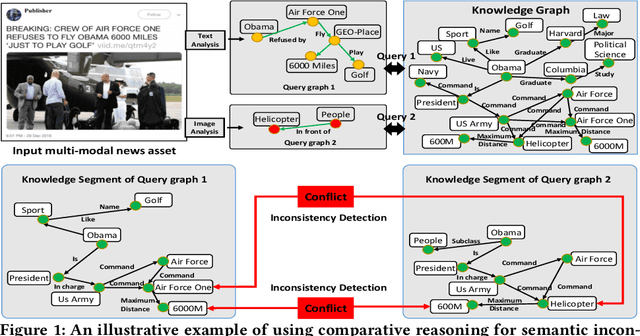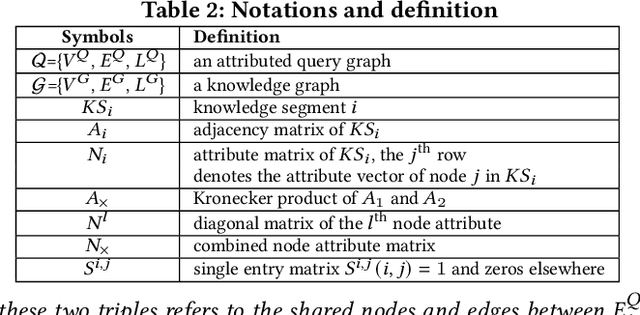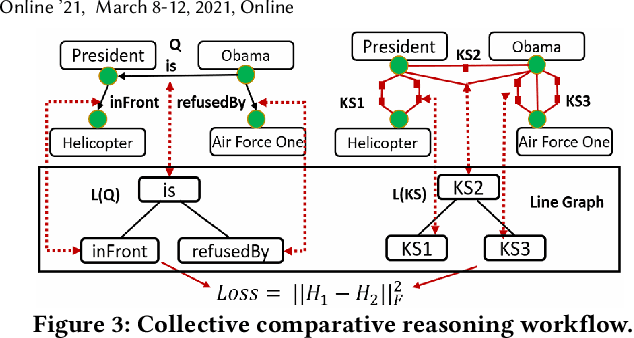Lihui Liu
$\mathbb{R}^{2k}$ is Theoretically Large Enough for Embedding-based Top-$k$ Retrieval
Jan 29, 2026Abstract:This paper studies the minimal dimension required to embed subset memberships ($m$ elements and ${m\choose k}$ subsets of at most $k$ elements) into vector spaces, denoted as Minimal Embeddable Dimension (MED). The tight bounds of MED are derived theoretically and supported empirically for various notions of "distances" or "similarities," including the $\ell_2$ metric, inner product, and cosine similarity. In addition, we conduct numerical simulation in a more achievable setting, where the ${m\choose k}$ subset embeddings are chosen as the centroid of the embeddings of the contained elements. Our simulation easily realizes a logarithmic dependency between the MED and the number of elements to embed. These findings imply that embedding-based retrieval limitations stem primarily from learnability challenges, not geometric constraints, guiding future algorithm design.
EVINET: Towards Open-World Graph Learning via Evidential Reasoning Network
Jun 11, 2025Abstract:Graph learning has been crucial to many real-world tasks, but they are often studied with a closed-world assumption, with all possible labels of data known a priori. To enable effective graph learning in an open and noisy environment, it is critical to inform the model users when the model makes a wrong prediction to in-distribution data of a known class, i.e., misclassification detection or when the model encounters out-of-distribution from novel classes, i.e., out-of-distribution detection. This paper introduces Evidential Reasoning Network (EVINET), a framework that addresses these two challenges by integrating Beta embedding within a subjective logic framework. EVINET includes two key modules: Dissonance Reasoning for misclassification detection and Vacuity Reasoning for out-of-distribution detection. Extensive experiments demonstrate that EVINET outperforms state-of-the-art methods across multiple metrics in the tasks of in-distribution classification, misclassification detection, and out-of-distribution detection. EVINET demonstrates the necessity of uncertainty estimation and logical reasoning for misclassification detection and out-of-distribution detection and paves the way for open-world graph learning. Our code and data are available at https://github.com/SSSKJ/EviNET.
EviNet: Evidential Reasoning Network for Resilient Graph Learning in the Open and Noisy Environments
Jun 08, 2025Abstract:Graph learning has been crucial to many real-world tasks, but they are often studied with a closed-world assumption, with all possible labels of data known a priori. To enable effective graph learning in an open and noisy environment, it is critical to inform the model users when the model makes a wrong prediction to in-distribution data of a known class, i.e., misclassification detection or when the model encounters out-of-distribution from novel classes, i.e., out-of-distribution detection. This paper introduces Evidential Reasoning Network (EVINET), a framework that addresses these two challenges by integrating Beta embedding within a subjective logic framework. EVINET includes two key modules: Dissonance Reasoning for misclassification detection and Vacuity Reasoning for out-of-distribution detection. Extensive experiments demonstrate that EVINET outperforms state-of-the-art methods across multiple metrics in the tasks of in-distribution classification, misclassification detection, and out-of-distribution detection. EVINET demonstrates the necessity of uncertainty estimation and logical reasoning for misclassification detection and out-of-distribution detection and paves the way for open-world graph learning. Our code and data are available at https://github.com/SSSKJ/EviNET.
PyG-SSL: A Graph Self-Supervised Learning Toolkit
Dec 30, 2024



Abstract:Graph Self-Supervised Learning (SSL) has emerged as a pivotal area of research in recent years. By engaging in pretext tasks to learn the intricate topological structures and properties of graphs using unlabeled data, these graph SSL models achieve enhanced performance, improved generalization, and heightened robustness. Despite the remarkable achievements of these graph SSL methods, their current implementation poses significant challenges for beginners and practitioners due to the complex nature of graph structures, inconsistent evaluation metrics, and concerns regarding reproducibility hinder further progress in this field. Recognizing the growing interest within the research community, there is an urgent need for a comprehensive, beginner-friendly, and accessible toolkit consisting of the most representative graph SSL algorithms. To address these challenges, we present a Graph SSL toolkit named PyG-SSL, which is built upon PyTorch and is compatible with various deep learning and scientific computing backends. Within the toolkit, we offer a unified framework encompassing dataset loading, hyper-parameter configuration, model training, and comprehensive performance evaluation for diverse downstream tasks. Moreover, we provide beginner-friendly tutorials and the best hyper-parameters of each graph SSL algorithm on different graph datasets, facilitating the reproduction of results. The GitHub repository of the library is https://github.com/iDEA-iSAIL-Lab-UIUC/pyg-ssl.
Meta Clustering of Neural Bandits
Aug 10, 2024Abstract:The contextual bandit has been identified as a powerful framework to formulate the recommendation process as a sequential decision-making process, where each item is regarded as an arm and the objective is to minimize the regret of $T$ rounds. In this paper, we study a new problem, Clustering of Neural Bandits, by extending previous work to the arbitrary reward function, to strike a balance between user heterogeneity and user correlations in the recommender system. To solve this problem, we propose a novel algorithm called M-CNB, which utilizes a meta-learner to represent and rapidly adapt to dynamic clusters, along with an informative Upper Confidence Bound (UCB)-based exploration strategy. We provide an instance-dependent performance guarantee for the proposed algorithm that withstands the adversarial context, and we further prove the guarantee is at least as good as state-of-the-art (SOTA) approaches under the same assumptions. In extensive experiments conducted in both recommendation and online classification scenarios, M-CNB outperforms SOTA baselines. This shows the effectiveness of the proposed approach in improving online recommendation and online classification performance.
Can Contrastive Learning Refine Embeddings
Apr 11, 2024Abstract:Recent advancements in contrastive learning have revolutionized self-supervised representation learning and achieved state-of-the-art performance on benchmark tasks. While most existing methods focus on applying contrastive learning to input data modalities such as images, natural language sentences, or networks, they overlook the potential of utilizing outputs from previously trained encoders. In this paper, we introduce SIMSKIP, a novel contrastive learning framework that specifically refines input embeddings for downstream tasks. Unlike traditional unsupervised learning approaches, SIMSKIP takes advantage of the output embeddings of encoder models as its input. Through theoretical analysis, we provide evidence that applying SIMSKIP does not result in larger upper bounds on downstream task errors than those of the original embeddings, which serve as SIMSKIP's input. Experimental results on various open datasets demonstrate that the embeddings produced by SIMSKIP improve performance on downstream tasks.
Conversational Question Answering with Reformulations over Knowledge Graph
Dec 27, 2023



Abstract:conversational question answering (convQA) over knowledge graphs (KGs) involves answering multi-turn natural language questions about information contained in a KG. State-of-the-art methods of ConvQA often struggle with inexplicit question-answer pairs. These inputs are easy for human beings to understand given a conversation history, but hard for a machine to interpret, which can degrade ConvQA performance. To address this problem, we propose a reinforcement learning (RL) based model, CornNet, which utilizes question reformulations generated by large language models (LLMs) to improve ConvQA performance. CornNet adopts a teacher-student architecture where a teacher model learns question representations using human writing reformulations, and a student model to mimic the teacher model's output via reformulations generated by LLMs. The learned question representation is then used by an RL model to locate the correct answer in a KG. Extensive experimental results show that CornNet outperforms state-of-the-art convQA models.
Neural Multi-network Diffusion towards Social Recommendation
Apr 11, 2023Abstract:Graph Neural Networks (GNNs) have been widely applied on a variety of real-world applications, such as social recommendation. However, existing GNN-based models on social recommendation suffer from serious problems of generalization and oversmoothness, because of the underexplored negative sampling method and the direct implanting of the off-the-shelf GNN models. In this paper, we propose a succinct multi-network GNN-based neural model (NeMo) for social recommendation. Compared with the existing methods, the proposed model explores a generative negative sampling strategy, and leverages both the positive and negative user-item interactions for users' interest propagation. The experiments show that NeMo outperforms the state-of-the-art baselines on various real-world benchmark datasets (e.g., by up to 38.8% in terms of NDCG@15).
KompaRe: A Knowledge Graph Comparative Reasoning System
Nov 06, 2020



Abstract:Reasoning is a fundamental capability for harnessing valuable insight, knowledge and patterns from knowledge graphs. Existing work has primarily been focusing on point-wise reasoning, including search, link predication, entity prediction, subgraph matching and so on. This paper introduces comparative reasoning over knowledge graphs, which aims to infer the commonality and inconsistency with respect to multiple pieces of clues. We envision that the comparative reasoning will complement and expand the existing point-wise reasoning over knowledge graphs. In detail, we develop KompaRe, the first of its kind prototype system that provides comparative reasoning capability over large knowledge graphs. We present both the system architecture and its core algorithms, including knowledge segment extraction, pairwise reasoning and collective reasoning. Empirical evaluations demonstrate the efficacy of the proposed KompaRe.
 Add to Chrome
Add to Chrome Add to Firefox
Add to Firefox Add to Edge
Add to Edge